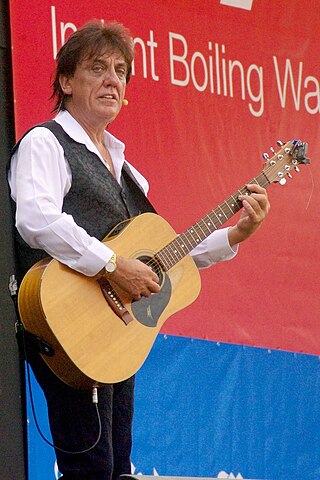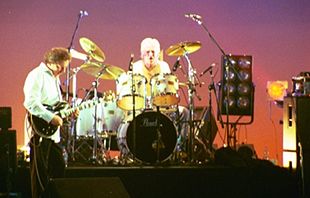
Blood, Sweat & Tears is an American jazz rock music group founded in New York City in 1967, noted for a combination of brass with rock instrumentation. BS&T has gone through numerous iterations with varying personnel and has encompassed a wide range of musical styles. Their sound has merged rock, pop and R&B/soul music with big band jazz.

Bird Noises is the first extended play by Australian rock group, Midnight Oil, which was released on 24 November 1980 under the band's own independent label, Powderworks Records / Sprint Music. It was produced by Leszek Karski and manufactured and distributed by CBS/Columbia. Bird Noises reached the Top 30 on the Australian Kent Music Report Singles Chart.
The Sports were an Australian rock group which performed and recorded between 1976 and 1981. Mainstay members were Stephen Cummings on lead vocals and Robert Glover on bass guitar, with long-term members such as Paul Hitchins on drums, Andrew Pendlebury on lead guitar and vocals, and Martin Armiger on guitar. Their style was similar to both 1970s British pub rock bands and British new wave. The Sports' top forty singles are "Who Listens to the Radio", "Don't Throw Stones", "Strangers on a Train" and "How Come". Their top 20 releases on the Australian Kent Music Report Albums Chart are Don't Throw Stones, Suddenly and Sondra.

The Swing is the fourth studio album by Australian rock band INXS, released in April 1984. It peaked at number one on the Kent Music Report Albums Chart for five non-consecutive weeks from early April to mid-May 1984. The lead single "Original Sin" was recorded in New York City with Nile Rodgers and featured Daryl Hall on backing vocals. Overall, the album featured a slightly harder-edged sound than their previous releases.
Boys were a hard rock band originally from Perth, Western Australia.
Kevin Nicholas Borich is a New Zealand-born Australian guitarist and singer-songwriter. He was a founding member of The La De Das, the leader of Kevin Borich Express, and a founding member of The Party Boys, as well as a session musician for numerous acts.

Jonathan James English was an English-born Australian singer, songwriter, musician and actor. He emigrated from England to Australia with his parents in 1961. He was an early vocalist and rhythm guitarist for Sebastian Hardie but left to take on the role of Judas Iscariot in the Australian version of the stage musical Jesus Christ Superstar from May 1972, which was broadcast on television. English was also a noted solo singer; his Australian top twenty hit singles include "Turn the Page", "Hollywood Seven", "Words are Not Enough", "Six Ribbons" and "Hot Town".
Peter William "Pete" Wells was the founder and slide guitarist in Australian hard rock band, Rose Tattoo, from 1976 to 1983. He was previously bass guitarist with the pioneering heavy metal outfit Buffalo from 1971 to 1976. Wells also had a solo career and issued albums, Everything You Like Tries to Kill You (1991), The Meaning of Life (1992), No Hard Feelings (1993), Orphans (1994), Go Ahead, Call the Cops (1996), It's All Fun and Games 'till Somebody Gets Hurt (1999), Hateball (2000) and Solo (2002). In 2002, he was diagnosed with advanced prostate cancer and, on 27 March 2006, Wells died of the disease, aged 59. Rose Tattoo were inducted into the Australian Recording Industry Association (ARIA) Hall of Fame on 16 August of that same year.

Procession were an Australian psychedelic band formed in Melbourne in 1967. The band was composed of drummer Craig Collinge, organist Trevor Griffin, bassist/vocalist Brian Peacock, and guitarist/vocalist Mick Rogers, all members of previous bands. They were described by Glenn A. Baker as one of the most ambitious bands in the Australian music scene in their time, in spite of a lack of commercial success. They were regularly championed in Go-Set magazine and had their own segment on music TV show Uptight, of which their manager was the producer.

Four Moments is the debut studio album by the Australian symphonic rock band Sebastian Hardie and was released in August 1975 by Polydor Records. It was their most commercially successful release. The single from the album was the instrumental "Rosanna", which peaked at #55 on the National singles chart. The title track takes up side one of the original vinyl LP release and is a suite of four parts. All tracks were written by lead vocalist / lead guitarist Mario Millo either on his own or with fellow band members Toivo Pilt, Alex Plavsic and Peter Plavsic. The distinctive logo, which would feature on future Sebastian Hardie releases, was designed by Larraine Hall. The album was produced by former band member Jon English.
Tim Gaze is an Australian rock and blues guitarist, songwriter, singer and producer. He was a member of several Australian groups from the 1960s to 1990s including Tamam Shud, Kahvas Jute (1970), Ariel (1973–74) and Rose Tattoo (1985–87). He also had a solo music career and released the albums, Band on the Run, Rough Trade (1992), Blue Sierra (1996) and Blues Remedy (1998). In April 2008 he issued a retrospective compilation covering both his group and solo work, Reckless Love: the Tim Gaze Anthology.

Paul Kelly is an Australian rock musician. He started his career in 1974 in Hobart, Tasmania and has performed as a solo artist, in bands as a member or has led bands named after himself. Some backing bands recorded their own material under alternate names, Professor Ratbaggy and Stardust Five, with Kelly as an individual member. As of September 2017, Paul Kelly's current band members are Cameron Bruce on keyboards and piano, Vika and Linda Bull on backing vocals and lead vocals, his nephew Dan Kelly on lead guitar and backing vocals, Peter Luscombe on drums and Bill McDonald on bass guitar.

Duncan Hazlett McGuire, was an Australian musician, songwriter, recording engineer and producer. McGuire was a founding member of the jazz fusion band, Ayers Rock from 1973 until he left in 1976. As a bass guitarist he appeared in several of Parkinson's groups including the Questions (1965–1968), Doug Parkinson in Focus (1968–1969) and the Southern Star Band (1978–1981). He went into music production in the early 1980s, in October 1980 he co-produced and engineered the debut self-titled album by Australian rock band, INXS. Duncan McGuire was diagnosed with lung cancer; and died in July 1989 of an associated brain tumour, aged 46.

O Zambezi is the fifth studio album by New Zealand rock band, Dragon. It was produced by Peter Dawkins and was released in September 1978 on vinyl and re-released on CD in 1988. The album peaked at number 3 on the Australian Kent Music Report which remains the band's highest charting album in that country. The album was certified platinum in Australia.
Mario Daniel Millo is an Australian musician and composer from Sydney, he was a member of symphonic rock group Sebastian Hardie from 1973 to their disbandment in 1977. Their debut album, Four Moments (1975) peaked at No. 13 on the Australian Kent Music Report Albums Chart. He has had a solo career and composed film and television soundtracks and scores. In 1978, he worked with Jon English on the soundtrack for the television series, Against the Wind and its related single, "Six Ribbons". Both album and single peaked in the Top 10 on the relevant Kent Music Report charts. The series had international release, known as Mot alla vindar/Mot alle vindar/Mod vinden (1980) in Scandinavian countries where the album and single reached No. 1 in Norway and No. 4 in Sweden. Millo's compositions have won Australian film industry awards for, The Lighthorsemen (1987) and television awards for, Brides of Christ (1991) and Changi (2001). Brides of Christ won an Australian Record Industry Association (ARIA) Music Award in 1992 for 'Best Original Soundtrack Album' - Millo was nominated for the same award in 1997 for G.P. and in 2002 for Changi.

Streetlife is the debut album by Australian rock group, Geeza. It was released in mid-1977 by Laser Records / RCA Records and was produced by Mario Millo. The first single, 'Run 'n' Hide', peaked at number 56 on the Australian Kent Music Report Singles Chart, while the second single, 'Song to Warilla', failed to chart.
Geeza are an Australian rock band formed in late 1973 in Sydney by Tony Cini, Gabriel Vendetti, Martin Adamson, Allan Fraiel and Ian Webb. Early in their career they performed as The Geeza Rock'n'Roll Show. The current lead vocalist and rhythm guitarist, Terry Halliday, has led the band through several incarnations since 1975 with founding members Cini, Watts, Marshall and Webb departing. The remaining four members released Geeza's only album to date, Streetlife, in late 1977. The album spawned a top 100 single, "Run 'n' Hide" on the Australian Kent Music Report Singles Chart. The group disbanded in 1979, before being reformed by Halliday in 2010, as the sole member from their 1970s line-up.
Galadriel were an Australian progressive rock group formed in 1969 by Garry Adams on guitar and vocals, Doug Bligh on drums, Gary Lothian on lead guitar, Mick Parker on bass guitar and flute, and John "Spider" Scholtens on lead vocals. According to Australian musicologist, Ian McFarlane, their debut self-titled album from May 1971 is, "one of the rarest major label progressive rock albums of the early 1970s... songs ranged in style from bluesy hard rock to jazzy ballads ." The group broke up in 1972. Galadriel was re-released in 1995, on CD, by Vicious Sloth Collectables.

Goodbye Tiger is the fourth studio album by Australian rock music singer-songwriter, Richard Clapton. It was released in August 1977 via Infinity Records/Festival Records and was produced by Richard Batchens. It peaked at No. 11 on the Kent Music Report Albums Chart. In October 2010 it was listed at No. 15 in the book, 100 Best Australian Albums.
Ronald Robert Peel, who also performed as Rockwell T. James, was an Australian guitarist, singer and songwriter. He was a member of numerous bands starting with the Missing Links and the Pleazers in the mid-1960s; then the La De Da's from 1972 to 1975 and in various backing bands for John Paul Young. He released a solo album Shot of Rhythm and Blues in 1977 under the James pseudonym, which provided his only top 40 single, "Roxanne". He co-wrote "Rock Me Gently" for Sherbet with its band members, which is a top 10 hit for that group. Peel died in 2020 due to an unspecified cancer.














